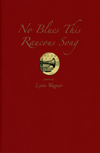No Blues This Raucous Song
I don’t usually fall in love with a book before I’ve even opened its cover. But it just happened with Lynn Wagner’s chapbook, No Blues This Raucous Song. This is a jewel of a collection – albeit a tiny one. From the deep red cover, to the gold and ivory pages, to the crisp letters and evocative poetry inside, every element of this collection is beguiling.
I don’t usually fall in love with a book before I’ve even opened its cover. But it just happened with Lynn Wagner’s chapbook, No Blues This Raucous Song. This is a jewel of a collection – albeit a tiny one. From the deep red cover, to the gold and ivory pages, to the crisp letters and evocative poetry inside, every element of this collection is beguiling.
As the title hints, Wagner’s poetry is musical. Populated by jazz musicians, dead female poets, lepidopterists and circus performers, each poem sings. The language here is taut, seductive, imploring.
One of my favorites, “Ninety-eight Degrees,” begins, “My tongue an iris bent low to your body, / stem whitening in the crease. / To be broken like that, having // green bleed away so that by June / the flower’s gone, succumbed / to summer heat, long-sleeved,” and moves through the hazy heat of summer with such despair, such passion, summoning Billie Holiday’s voice, God, the moon.
Wagner’s poems are funny, like “My ex-lover comes back into my life” which compares an ex-lover to a stray dog; and they are sexy, like “So What” (presumably a take on the famous Miles David tune) that pulses, “Playing // around the woman’s thigh / or lips // brushed any which way // slow.” Despite its size, No Blues This Raucous Song is filled to the brim with beauty and heartache and rhythm – the very things that make poetry so enjoyable. Wagner’s is not a complicated aesthetic, but she captures each moment with expert precision. Her poetry conveys desire so perfectly that the heat fairly rises from the page. The opening poem, “Unjust Spring,” turns bunches of flowers into objects of worship:
The irises
in the flower man’s white plastic bucket
shrivel and frill. They miss Costa Rica and are all bruised tongue.
Even the daffodils disappoint – their deep trumpets
soundless, fiery stigma and anthers
pining for honeybees. There is never enough.
It’s true, there is never enough, especially where chapbooks are concerned; they are such a tease – an amuse bouche in the world of poetry. Nonetheless, No Blues This Raucous Song, in all its tactile, rich, rhythmic glory, beckons to be savored.





